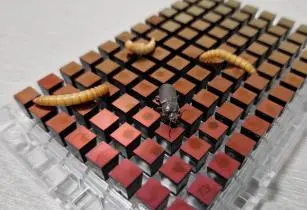Ÿnsect, the world leader in insect production, on 6 June, announced the creation of a genotyping chip named Axiom YNS_Mol1, a world-first for insect breeding and a major step in the evolution of selection of larvae lines to produce insect-based proteins
Announcement of this novel chip comes a year after Ÿnsect launched the ŸnFABRE project, and is dedicated to the Tenebrio molitor mealworm, which will allow for selection based on the genomic diversity of the species. Made available to the wider scientific community, it represents a key element of Ÿnsect’s strategy, as well as a groundbreaking tool for fundamental research in the sector.
Developed with Thermo Fisher, this genotyping chip represents a very powerful lever for the sustainable development of insect farms. Until now, producers have mainly focused on selecting the bigger larvae, but this kind of overly restrictive practice of mass selection could lead to inbreeding and its detrimental consequences. For insect breeding in particular, it is essential for large-scale farms like Ÿnsect to select the best lines while ensuring real genetic diversity.
The genomic selection delivered by the Axiom YNS_Mol1 chip makes it possible to achieve these objectives. It targets the genetic characteristics of interest while covering the entire genome to guarantee diversity. The selection is based on four families of phenotypes – or biological traits – linked to growth performance, reproduction, food conversion and disease resistance. In all, more than 4,000 individual insects were analysed to model this innovation.
“Ÿnsect’s ambition is to contribute to the development of a new economic, social and sustainable model, which proposes new ways of consuming and producing, in order to meet the major environmental and climatic challenges of our era. For 12 years we have been innovating, with the goal of advancing the food industry and democratising the insect. Our genotyping chip for the Tenebrio molitor beetle is a world-first for our industry and will contribute to the sustainable structuring of the entomoculture sector,” said Antoine Hubert, CEO of Ÿnsect.




